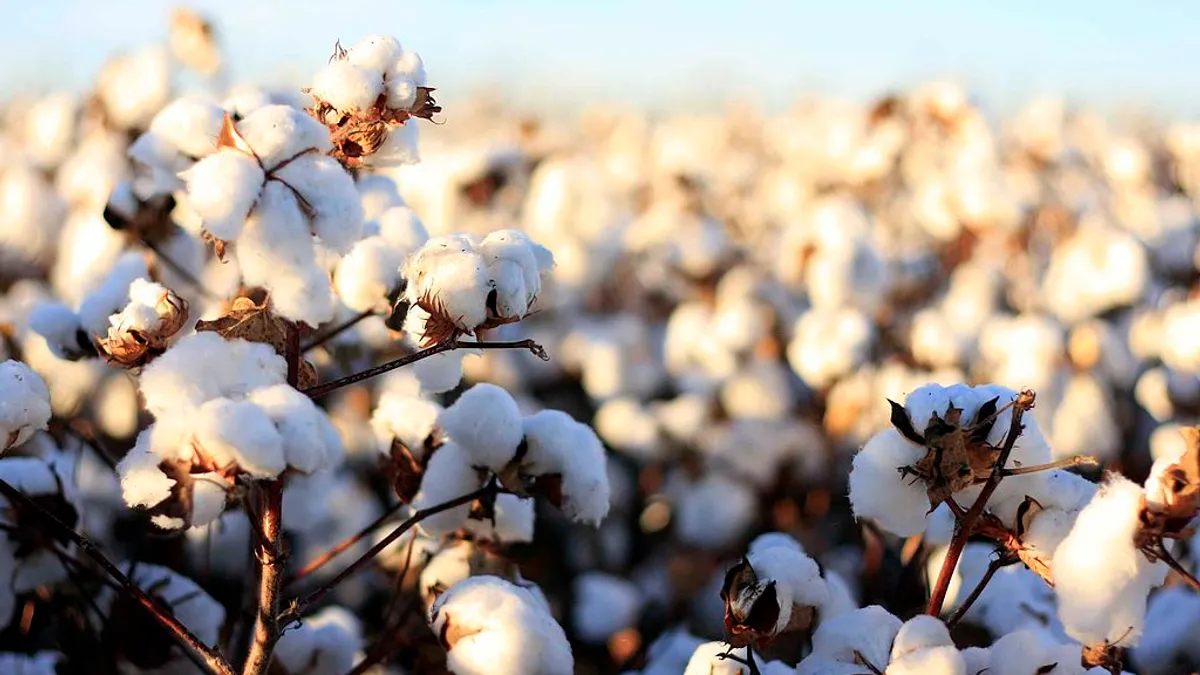Dive Brief:
- Gap, Nike and Levi Strauss represent several of the American apparel brands highlighted as leaders in sustainable cotton sourcing, according to the Better Cotton Initiative (BCI).
- These 92 retailer and brand members sourced over 1 million metric tonnes of Better Cotton, which represents 4% of global consumption, according to BCI.
- In 2018, only four companies — Adidas, HEMA, Marimekko and Stadium AB — could boast of sourcing over 90% of their total cotton as Better Cotton. In addition, Gap and Nike were denoted as "fastest movers" in 2018 by BCI, meaning they increased the use of Better Cotton by more than 20% compared to 2017.
Dive Insight:
The Better Cotton Standard System, according to BCI, is a "holistic approach to sustainable cotton production which covers all three pillars of sustainability: environmental, social and economic." Better Cotton Principles and Criteria stand atop seven guiding principles:
- Minimization of the harmful impact of crop protection practices
- Water stewardship
- Health of the soil
- Responsible land usage and biodiversity
- Preservation of fiber quality
- Decent work
- An effective management system
Gap brands, which have been lauded for their sustainability efforts, recently committed to sourcing 100% sustainable cotton by 2025. Their commitment and implementation — which included increasing their cotton sourcing volume by 20% year-over-year — was recognized by BCI's 2018 ranking.
Ralph Lauren, which joined BCI in 2016, recently announced its own commitment to the same standards as Gap, setting their sights on 2025 as well. The apparel company's aggressive shift in sustainable sourcing and improved supply chain faces significant challenges, as those goals include cotton, polyester, viscose, down, wool, leather and cashmere, with cotton representing 78% of total materials used.
One of the underpinning principles for Better Cotton — decent work — encompasses the issue of forced labor, a subject that has carried significant business and social cost. Earlier this year, Badger Sportwear announced it had cut ties from Hetian Taida Apparel, a garment factory in the western Xinjiang region of China after an AP investigation revealed the factory was being operated by unpaid detainees and surrounded by armed guards and dogs. Once the need to eliminate such inhumane practices in a country is exposed, it is a difficult challenge to regain global stature.
Uzbekistan, the world's seventh largest producer of cotton, faces such an uphill battle. The country faces a continued boycott against its cotton industry, including a majority of the highest-ranked companies on BCI's retailer leaderboard. Uzbekistan has worked to overcome its usage of forced adult labor and child labor and, while the International Labor Organization (ILO) has noted signs of improvement, remarked that approximately 6.8% of the workforce still do harvest work for no pay. As a result, even with this 6.8% falling from 14% in 2015, cotton exports have declined by 63.4% during that same period of time.
Correction: Previous version of story misidentified location of Adidas' headquarters.















